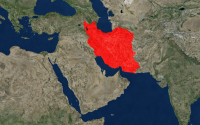11 June 2006John Brown
The press tells us that our "thrilled" President was "conservative" or "carefully guarded," or expressed "cautious optimism" in responding to the death of Abu Musad al-Zarqawi, the small-time thug, beheader, fomenter of Sunni/Shia civil war, and all-around violent extremist who became an American poster boy for terrorism in Iraq. Who had even heard of him until, as British journalist Patrick Cockburn points out, "he was denounced in 2003, by Secretary of State Colin Powell before the UN Security Council as the link between Saddam Hussein and al Qaeda."
Zarqawi was the most minor of minor figures, used by the Bush administration mainly as bogus "evidence" of the Saddam/al-Qaeda connection until he made himself conveniently available to step into the explanation gap left open after Saddam had been captured and things in Iraq only got worse.
His face filled the screen in life and death malevolently and photogenically. He looked the villain -- particularly useful for an administration focused on a Manichaean world of good and evil, governing a country that tends to like its enemies straight-up and, if at all possible, personified in a single face. So it didn't take long before Zarqawi was America's most-wanted man in Iraq.
As far as we can tell, he never actually controlled more than a few hundred to a thousand Iraqis and foreign jihadis (though he may have trained others in Iraq, which in the wake of the American invasion has indeed become the President's "central theater in the war on terror," for mayhem elsewhere). He was, as Megan Stack of the Los Angeles Times wrote, more "looming image" than military commander. But his great skill, like that of his al-Qaeda betters, lay in creating his own outsized image and in imagining the brutal attack or slaughter of civilians that would, by its nature, draw the camera and magnify his importance.
The Bush administration helped inordinately, putting a $25 million dollar reward on his head, crowning him the "prince" of Al Qaeda in Iraq. Karen de Young and Walter Pincus put it this way in the Sunday Washington Post: "[Administration] magnification of his role and of the threat he posed grew to the point that some senior intelligence officers believed it was counterproductive."
Now, he's dead and, in death, he's gotten the kind of news attention once devoted to Saddam (who was, at least, a significant regional figure to be reckoned with). On the night his death was announced, CBS prime-time news was typical in devoting almost every moment of a half-hour newscast scoured of actual news to his death alone, as it otherwise might have done only for a major world figure. The full "news" to be gleaned from that half hour was evident in the first fifteen seconds: Zarqawi is dead.
Our papers are filled with discussions of whether or not, after so many Iraqi "turning points" that weren't, this one is. Our "cautious" President nonetheless hailed Zarqawi's death as "a victory in the global war on terror" and spoke -- in one of those plagiarized Churchillian phrases his speechwriters favor (perhaps because they transport us out of the ugly present and back into a version of World War II once seen in movie theaters) -- of how this might represent "an opportunity for Iraq's new government to turn the tide of this struggle." This is "cautious" only compared to a President who, as late as November 2005, used "victory" fifteen times in a single speech on Iraq. One "victory" to a speech is indeed something of a victory deficit for him.
But haven't we been through all this before? Haven't we had our turning points, turned our many "corners," passed all those "milestones" again and again? When Saddam's sons were killed in a shootout at their safe house, when Saddam was plucked from his "spiderhole," when endless "key lieutenants" of Zarqawi were reported rounded up or killed, when several elections took place? Now, Zarqawi has been plucked from his "spiderhole" too… well, whatever it was, under whatever circumstances those were.
As is typical of absolutely any story out of this Pentagon, the details of the first version of the Zarqawi death are already beginning to blur and shift. Did a child die in the rubble? Was Zarqawi really alive in that devastation? Did American soldiers find him and try to administer first aid, as a military spokesman reported? Or did American soldiers beat the wounded terrorist to death, as CBS reported a witness saying Saturday? Or could our troops have kicked him repeatedly in the chest while shouting for him to reveal his name, as Hala Jaber, Sarah Baxter, and Michael Smith report in the London Sunday Times? Did he mumble a few unintelligible words and quickly expire, as the first U.S. military reports had it? Or did it take him, as other witnesses reported, an hour and fifteen minutes to die after Iraqis living near the house in which he was hiding pulled him from the rubble? Was he really turned in by someone in his own organization, as some American reports have had it, or is that just a nice little piece of U.S. disinformation meant for whatever is left of his movement? Was he tracked down by Jordanian intelligence or turned in by some part of the Sunni resistance which loathed his tactics? We don't know, but stay tuned.
In the meantime, "cautious" administration officials, hardly capable of containing their glee, sensing an approval-rating bump in the polls (however brief), are trying to manage a situation that may prove especially dangerously for them. They may soon find themselves caught in the tangles of, to coin a phrase, their own self-fulfilling propaganda.
Let me, on this, be neither conservative, nor cautious. Every now and then, you have to rely on history as your guide. And hasn't this happened to us enough? Don't we know that, in every turning-of-the-tide moment in Iraq, it soon turns out that, despite the hoopla, our tide was ebbing and someone else's invariably rising? A number of experts are already suggesting that Zarqawi's death will have "minimal impact" on the Iraqi resistance and may, in fact, serve to strengthen it by removing the most divisive and detested oppositional figure in the country; or perhaps, as the superb independent journalist Nir Rosen suggests in a thoughtful obit at the Truthdig website, Zarqawi's death "was the greatest advertisement for his cause" and the path he blazed into sectarian warfare is now unstaunchable.
Paul Woodward of the War in Context website sums matters up this way:
"Zarqawi's death fits on a trend line. Unfortunately for the Bush administration and the Iraqi government this isn't a trend of increasing success in quelling the insurgency. On the contrary, it seems to reflect a growing hostility between native and non-native Sunni insurgents. Zarqawi's loss may be a blow to foreign jihadists, but many Iraqi Sunni insurgents may now be quite comfortable seeing him ‘promoted' yet operationally sidelined as a jihadi emeritus."
Already we know that, in the wake of Zarqawi's death, our President and his military advisors no longer believe a simple announcement of a draw-down of American forces in Iraq to the 100,000 level by year's end is possible, not even to help Republican candidates in the midterm elections. (In fact, the numbers on American troops in Iraq, while murky, are actually on the rise.) According to David E. Sanger and James Glanz of the New York Times in a piece headlined, U.S. Seeking New Strategy for Buttressing Iraq's Government, the President is convening a "two-day strategy session" at Camp David this Monday "to revive highly tangible efforts to shore up Iraq's new government."
The report cites "several" of the unnamed "American officials" who invariably swarm through such stories as reviving one of the oldest and most patronizing images from the early days of the Bush administration's Iraq fiasco: "It is also an effort to hand off leadership to Mr. Maliki's government and, in an analogy used by several American officials, to begin to let go of the bicycle seat and find out if the Iraq government can stay upright with less American support." Okay, it used to be "taking the training wheels off." The President's men are, the journalists report, looking "at the costs of maintaining a[n American military] force of roughly 50,000 troops there for years to come." Nonetheless, "one of the senior officials involved in the strategy session" characterized this moment in Iraq as a "last best chance to get this right." Last? Best?
I wonder what they'll be saying in November 2006? February 2007? Or in any of those post-Zarqawi "years to come"? The real question is: How many more turning points and ebbing tides can the American people (and the American media) take?
In the meantime, since President Bush has not commandeered the television screen to address the American people on the latest wrinkles in his "strategy for victory" in Iraq, former diplomat John Brown, who resigned his State Department post in 2003 to protest the onrushing invasion of Iraq, and who now compiles the Public Diplomacy Press Review, thought he might lend the President a hand. And so, as George Bush's latest speechwriter, he offers him -- and the rest of us -- the following address to the nation. Tom
The President Addresses the Good American People about Total Victory, Evil WMD, and VNTME
By John BrownOffice of the Press Secretary
The White House
Text of President Bush's Televised Address to the Nation
Embargoed until Tuesday, June 13, 8:00 pm
My fellow Americans,
Given all the turning points in Iraq that we have experienced together, my trusted advisors have urged me to speak cautiously at this triumphant moment.
None of us wants to get dizzy with success, after all. But I feel it's important to share good news with you, the American people. We have reached a milestone on the road to victory and you deserve to know my innermost thoughts at this moment of momentousness. We are truly in a state of big Mo, as my Poppy would say.
Let me take you back along the glorious path that we have traveled together so far: On D-Day, we landed at Basra. We advanced speedily through the hedgerows of southern Iraq onward to the totalitarian Islamofascist regime's capital in Baghdad, which we took.
Then, for three hard years, we faced our Battles of the Bulge: We bent, but we never broke. We captured Saddam. We -- I mean they, the Iraqis -- held parliamentary elections. In the Green Zone, we're building the world's biggest U.S. embassy, as big as historic Vatican City in Rome, Italy.
And now, just last Thursday, came the major turning point toward total victory in Iraq: two Made-in-the-USA 500-pounders from the skies got rid of al-Zarqawi, the Jordanian-born terrorist that bin Laden called the "Prince of al Qaida in Iraq."
At 6:15 p.m. Baghdad time, Special Operation Forces, acting on tips and intelligence from good Iraqis, confirmed Zarqawi's location, and delivered justice to the Gillette-hating jihadist whose evilness was proved because he couldn't shoot straight with an M-16 and wore white American tennis shoes -- a video from the Defense Department demonstrated this beyond the shadow of a doubt.
With Zarqawi now in Christian hell, we can continue our war on terror with renewed confidence and energy. We can pursue even more than before the main goal of this good war: to eliminate weapons of mass destruction, the evil WMD of all shapes and forms that threaten to ruin our country.
To keep Americans safe from WMD, I continue to ask the help of the Almighty. I pray every day that He give me, as well as the good vice-fighting Vice President and the good Secretary of Defense, leadership skills. Our prayers have been answered. We, blessed by Him, are your triple-punch access to safety, your home team against the axis of evil.
Thanks to God and our dedicated men and women in uniform, we now know that there are no evil WMD in Iraq. For that great achievement I also thank you, the American people.
How can I ever forget our joint celebration of our sacred shock-and-awe triumph in the not-good cradle of evil civilization! How can I ever forget when I landed on the aircraft carrier USS Abraham Lincoln, greeted so enthusiastically by our military and filmed so patriotically by the good folks from FOX!
In my flight suit, I could hear you all inside my heart cheering me on as you sat in front of your TVs. I could feel the goodness in your hearts, how you supported me and my good war. I felt good all over. Despite terrorists, revisionists, and all the evil people who have infiltrated this country -- even as we send our troops to every border -- I still do.
Our fight against WMD is now being fought here at home as well. The millions of telephone calls that our now-good, reformed intelligence community carefully analyzes give us more and more leads into evil WMD, actual or potential.
Let me cite an example of our success. The good Martha Hsubdam, of Topeka, Kansas, called her good sister-in-law Mary in Cincinnati, Ohio. She said that her not-so-good teenage stepson Joe, without telling her about it, was fooling around with an evil new computer "game" called "Terror Is an Error."
Our good folks at the National Security Agency, always on the alert, intercepted that good-to-know-about phone conversation. Now, not-good Joe, who has acne because he secretly studied the Koran, is in a maximum security jail, serving a ten-year sentence.
Imagine what would have happened if not-good Joe were not behind bars: He might have grown a bad, smelly beard, joined the evil Al Qaeda, and started making vicious WMD with his chemistry set. He could have become a Zarqawi here in the homeland. But dedicated law enforcement prevented this. That's the kind of good work that makes me sleep good at night, after I've said my prayers, read my Bible, and kissed my good Laura good night.
My fellow Americans, we are also taking steps to eliminate another type of WMD that we have discovered yet again in our midst on the eve of another good American democratic election -- Women/Men Destroyers. These are evil people who don't believe in our traditional good marriage of a man and a woman, the kind of marriage Laura and I are blessed to have thanks to divine intervention. These holy-matrimony haters refuse to accept, as I said recently, that "marriage cannot be cut off from its cultural, religious, and natural roots without weakening this good influence on society."
My weapon in this good struggle against violent, non-traditional marriage extremism or VNTME is the Marriage Protection Amendment. Some not-good VNTME supporters kept the amendment from passing in the Senate this time, but we will never stop working to make it part of the laws of our good land.
Finally, my fellow Americans, we have not forgotten WMD overseas, even in the wake of our mission accomplished in Iraq and the liquidation of Zarqawi. We are now focusing on an evil country called Iran.
Trust me, I won't urge the Uraniums to "bring it on," as I have learned from my infrequent mistakes. Instead, here's what your government, now better than ever after its heck of a job with Katrina, is doing even if such a new initiative sounds sophisticated: We are demanding that Iran stop thinking about making mushrooms dishes and start focusing on Rice recipes, at least for a while. If that doesn't work, all options are on the table, including Texas barbeque with homeland-made Zarqawi sauce and Haditha seasoning provided free of charge by the Pentagon.
May God continue to bless America.
John Brown, who writes regularly for Tom Dispatch, is a former diplomat who compiles the Public Diplomacy Press Review, available free upon request at the site or by emailing [email protected].






